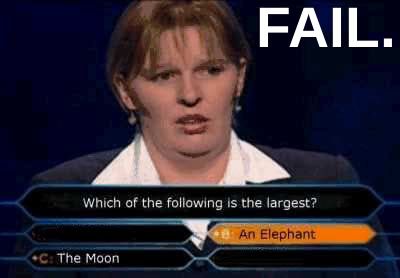@SWORD of GOD,
Failed out of the starting gate, Sword.

I will now tear you apart, one slice at a time. Or what I like to call "fun".
Quote:To have any enduring claim to viability the theory of evolution must explain the origin of life in its own terms.
Fail. Evolution does not and has never needed to explain the origin of life. Read the title... "Origin of
Species". You want to target life's origins, that's another field. Try a few doors down.
Quote:It must be able to answer the question, “How did life evolve from non-living forms?’
Again, wrong field. Try again. Life did not "evolve" from non-living forms. Life emerged from chemical chains and proteins... but it did not evolve from them. Evolution applies only to living organisms, and is not relevant to the origins of life.
Quote:It needs also to explain how the notion of “selection for survival” operates before life exists, to explain how “life” is the best way for non-living forms to exist longer.
You again, didn't I tell you this is the wrong door? The notion, as you call it, did not "operate" before the existence of life. Say it with me Sword... Evolution applies only to living organisms and has no bearing on, nor is affected by, the origins of life.
First: The Rhinoceros did not exist "aeons" ago. The Rhino is fairly new... as early as 10,000 years old.
Second: You clearly miss the concept of evolution. The chance part you get... that's the one the creationists ALWAYS hit dead on. However they have no idea that there's a non-random part that plays as much of a role as the random. It's the whole "natural selection" half of the theory... the part that puts pressure upon life, the part that removes the life which is not best fit for its environment. When you throw that in, it's easy to see that life will adapt when given sufficient environmental pressure. There are several tested and reproduceable tests to show this. I can supply a few if you want.
Quote:Moreover, if life is an adaptation, why is it the same across the whole range of living forms (animal or plant or in-between)? We have innumerable varieties of living forms (adapted, we are told, to different conditions of climate and competition for food resources) but we do not have different varieties of being alive. Is that what we should expect? Should we not expect that the creatures who lived longest (and had offspring the least often) would have out-survived all competition, until eventually they lived so long it was for ever? Or, vice-versa that those who lived the shortest lives (and therefore had more offspring more often) eventually fell back, after aeons of trial and proof, into hardly being alive at all individually, but merely replicating themselves? In fact, of course, the same climate and conditions of competition for food resources support both relatively long- and relatively short-lived forms at every level of complexity and thoroughly intermingled within even the same individual life-form.
I'll attack this in one fell swoop: No.
First answer: It is not the same across the board. The basic concept is, but the rate, selective pressure and results will be as wide as your imagination.
Next: Define "varieties of being alive". I think I get what you are aiming for, but it's so off the course that I'm not really sure.
Wow, you're really out there. The rest of this thing is full of strawmen, logical fallacies... the whole nine. It's obvious that whoever wrote this has no idea what evolution, or science for that matter, really is.
Ohhhhhhhhhh... I get it! You think that evolution = atheism = THE WEST. Gotcha.